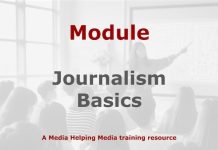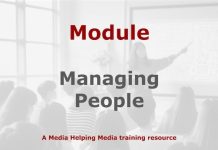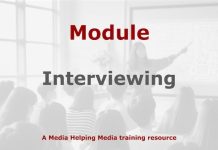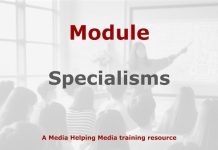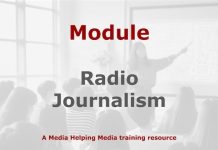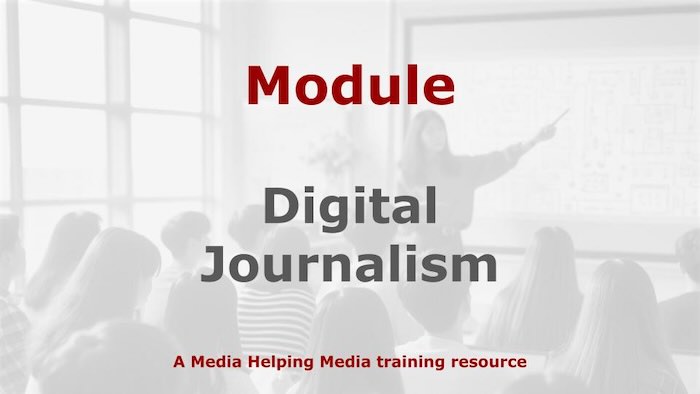 This free, six-week adaptable module is designed for universities and colleges to teach the editorial management skills needed to run a sustainable, audience-focused digital news operation.
This free, six-week adaptable module is designed for universities and colleges to teach the editorial management skills needed to run a sustainable, audience-focused digital news operation.
The module, which is created from more than 30 learning resources on Media Helping Media, covers online journalism, data journalism, the use of AI in news production, social media, and the efficient organisation of teams and resources for multiplatform content delivery and engagement.
Week 1: The digital newsroom – principles and organisation
Learning outcomes:
- Understand the evolution from traditional to digital-first newsrooms.
- Explore newsroom convergence and the roles required for multiplatform journalism.
- Learn systems thinking for effective editorial management.
Resources:
- From digital denial to digital first
- Convergence: transforming news production
- Convergence workflows roles and responsibilities
- Creating a converged news operation
- Lesson – creating a converged news operation
- Systems thinking for journalists
- Lesson: Systems thinking for journalists
Activities:
- Workshop: Map your ideal digital newsroom structure.
- Group discussion: What does convergence mean for editorial workflow?
Week 2: Producing and managing online news content
Learning outcomes:
- Master the essentials of online news production and content presentation.
- Learn the importance of timely updates and engaging digital storytelling.
Resources:
- Managing a news website’s front page
- Presenting news content online
- Old news is no news, updates are essential
- Updating an online news item
- The uneasy but essential evolution of news
Activities:
- Workshop: Rewrite a breaking news story for web, mobile, and social platforms.
- Exercise: Simulate updating a developing story across platforms.
Week 3: Data journalism – tools and techniques
Learning outcomes:
- Understand the fundamentals and editorial potential of data journalism.
- Develop skills in computer-assisted reporting and using data tools.
Resources:
- What is data journalism?
- Good journalism has always been about data
- Computer-assisted reporting (CAR)
- Data journalism – resources and tools
- Data journalism glossary
Activities:
- Workshop: Use a free data tool to find a story in a public dataset.
- Glossary quiz: Test your understanding of key data journalism terms.
Week 4: Artificial intelligence in news production
Learning outcomes:
- Explore the uses and limits of AI in journalism.
- Learn how to detect AI-generated content and address algorithmic bias.
Resources:
- What can AI do for journalism
- Hey AI, what are the top stories of the day?
- Using AI for story development
- How to detect AI-generated images
- Dealing with algorithmic bias in news
- Lesson: Dealing with algorithmic bias in news
- Lesson – AI in news
- AI and investigative journalism
- Lesson: AI and investigative journalism
Activities:
- Group debate: Should AI write news headlines?
- Case study: Identify and critique an example of algorithmic bias.
Week 5: Social media and audience engagement
Learning outcomes:
- Develop strategies for social media integration and audience participation.
- Understand the importance of bringing the audience into the news conversation.
Resources:
- Social media test for mainstream media
- Presenting news content online
- Old news is no news, updates are essential
Activities:
- Workshop: Create a social media plan for a news event.
- Group practice: Simulate a live Q&A with audience participation.
Week 6: Editorial management for sustainable digital news
Learning outcomes:
- Learn how to organise teams and resources for efficient, multiplatform content production.
- Develop management skills for leading a sustainable, audience-focused news operation.
Resources:
- Creating a converged news operation
- Convergence workflows roles and responsibilities
- Lesson – creating a converged news operation
- The uneasy but essential evolution of news
Activities:
- Simulation: Assign roles and plan coverage for a major breaking story across all platforms.
- Reflective essay: What does it take to lead a digital newsroom that serves and engages its community?
Module adaptation and assessment
- This module is free to download and adapt.
- Assessment suggestions: portfolio of digital stories, group project on newsroom organisation, reflective essays, and quizzes.
- Encourage feedback and iteration to ensure relevance to local contexts and emerging digital trends.
This module can be freely adapted and expanded to suit the needs of any journalism education provider, ensuring graduates are prepared to lead in a rapidly evolving digital media landscape.

